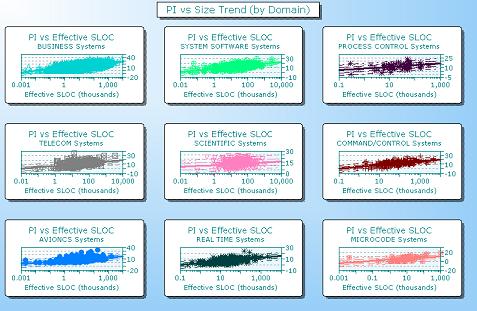On our Software Productivity Declines Over Time post, ISBSG's Peter Hill left an interesting comment:
... your findings that 'average productivity increases with project size' might raise a few eyebrows, but the ISBSG data produces the same finding. Of course we only have data on projects that were completed. I wonder about the incidence of abandonment of large projects.
The QSM database shows a positive correlation between system size and productivity. The following chart shows PI vs. System Size regression fits for 9 different application domains (Business, System Software, Process Control, Telecom, Scientific, Command & Control, Avionics, Microcode, and Real Time). Regardless of domain, average productivity increases with system size:

In the SLIM-Estimate user's guide, we speculate about possible explanations for the relationship between productivity and system size:
Small systems tend to have lower average PIs than large systems. We can only speculate as to the reasons, but two important influences may be management influence (the way large and small systems are planned, managed, and funded) and economies of scale.
Larger projects have a higher profile and tend to be strategically important to the organization. For this reason, they are generally managed and staffed by the most skilled and experienced team members in the organization. They are more likely to be heavily capitalized, with access to the best technology available. This may explain in part why they perform better. There may also be economies of scale enjoyed by larger projects. The typical startup activities and learning curve may have less impact over a longer project schedule.
Small systems, on the other hand, are often managed in a more informal fashion. Team members must often divide their time between several small projects. Small projects may have lower priority or use more junior team members. Frequently they are not well capitalized. The start-up period can occupy a greater percentage of a short project schedule. These factors may explain their relatively lower productivity.
What do you think? Leave a comment or vote in our online poll!
